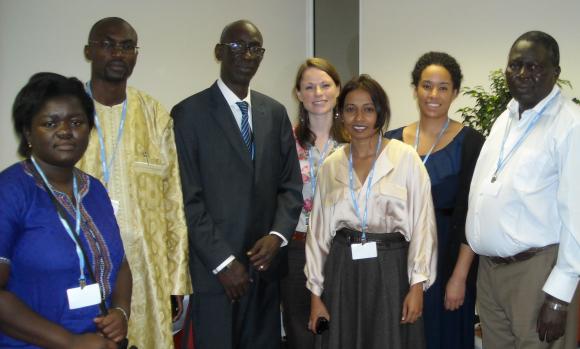PROVIDENCE, R.I. [Brown University] — The opportunity came to Brianna Craft in a session of J. Timmons Roberts’ Climate and Development Lab. The Least Developed Countries bloc was looking for someone to offer administrative support at the upcoming climate talks in Durban, South Africa, and Craft, a first-year graduate student in the environmental studies program, quickly raised her hand. With that one swift gesture, Craft opened the door to an opportunity few people ever have: an inside look at international climate talks, where she witnessed candid political conversations and the stark disparities that are making it difficult for countries to work together toward climate justice.
Craft said her eagerness to participate was motivated both by the chance at a behind-the-scenes look at how negotiations played out, but also by something a bit closer to home. “On a more personal level, it kind of fit. As an African American, I have seen my life play out in black and white in this country, and on a global scale, the most affected (by climate change) are the 33 African countries.”
So in mid-November, Craft set out alone for Durban, a full week ahead of the rest of a Brown delegation of researchers and students, led by Roberts, that would also be attending the conference. She had no idea what she’d be doing when she arrived and had never met the two people she’d be working under: Achala Chandani, a lawyer for the International Institute for Environment and Development, which supports the LDC, and Pa Ousman Jarju, chair of the bloc. “It was very exciting, but scary,” Craft recalled.
Compared to developed countries, the LDC delegation was quite small, with only four representatives per country, so advanced preparation was key. The goal of the first week was to help the under-resourced LDC fully participate in the negotiations. The group worked every day from 9 a.m. to 6 p.m, strategizing about how to secure a commitment from the developed countries to work toward closing the climate justice gap, either through higher emissions standards or compensation. Craft's duties included note-taking, helping to prepare meeting agendas, and, as the only native English speaker in the group, editing press materials.
According to Craft, preparing for negotiations required the LDC to steel themselves for potential opposition from the more powerful developed countries. Their sense was that cooperation might not be easy to come by. “Pa kept saying ‘We need to stick to our guns and see it through no matter what,’” Craft said.
Despite all the prep work, it wasn’t until the negotiations started that Craft realized the uniqueness of her position. Armed with a Gambian delegate’s badge, she had complete access to closed-door talks, most likely a once-in-a-lifetime experience. “It’s surprising how frank everyone was. What’s said behind the scenes was off the record so everyone says what they want and what they’ll give to get it.”
Craft witnessed a roundtable discussion of 18 representative countries led by Todd Stern, U.S. Special Envoy for Climate Change. She reported being shocked by his candid manner, outlining very matter-of-factly what the U.S. was willing and unwilling to do. Craft also realized that developed countries like the U.S. have a huge advantage in such negotiations. With a large delegation and full administrative staff, U.S. delegates were able to work in shifts and have downtime to rest, even in the final 36 hours of non-stop negotiations. With only a handful of delegates, the LDC was even unable to attend all of the meetings. The lack of delegates forced Pa, the group’s chair, and others to work round the clock. “He was always the first one there and the last to leave."
Such disparities didn’t hinder Craft’s hope for the LDC’s future. “I’m still optimistic about the future, because it’s the little things that can make a big difference: more delegates, more secretaries.” She plans to continue working with the group and hopes to resume her supporting role with them at the 2012 conference in Qatar.

